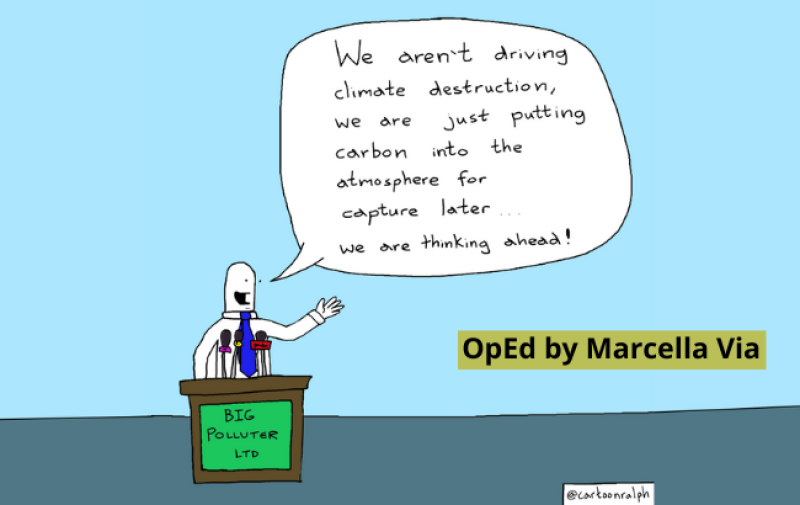Stay always informed
Interested in our articles? Get the latest information and analysis straight to your email. Sign up for our newsletter.

In February 2024, big polluting corporations, led by the chemicals lobby group CEFIC, launched the 'EU Industrial Deal', or 'Antwerp Declaration', which pushes for business-friendly EU decision-making, deregulation of toxic products, and more public subsidies for business as usual.
It was launched behind closed doors in the presence of European Commission president Ursula von der Leyen and Belgian Prime Minister Alexander De Croo.
This article was written by Marcella Via (CEO) and originally appeared in EU Observer.
Lobby groups such as BusinessEurope and the European Round Table for Industry followed up with further initiatives echoing this approach, calling for more free trade rules which strengthen corporate power and “the removal of barriers to strengthen the Single Market” – including rules for a social and just green transition.
Unsurprisingly, the industry promotion of the Antwerp Declaration follows their successful sabotage of important legislative proposals, which are urgently needed to protect nature, biodiversity, and public health.
One example is the gutting of the Chemicals Strategy for Sustainability and the Farm to Fork ambitions. In these cases, industry lobbies and their allies have managed to delay and sideline the Green Deal's proposals to reduce and replace toxic substances that harm health and ecosystems.
They have also waged a relentless attack on the Farm to Fork promise to cut pesticide use and harm in half by 2030.
But what are the key corporate demands at the core of the Industrial Deal, and what would their impact be?
First, industry is asking to be subsidised via massive public funds at the EU and national level to ‘de-risk’ investments in infrastructure and ‘net-zero’ technologies. But investing in carbon capture and hydrogen will lock in further disastrous fossil fuel use and enable business as usual for Europe’s biggest polluters.
By demanding far-reaching and speedy deregulation under the guise of ‘competitiveness’ and ‘innovation’, industry is also pushing to roll back existing social and green rules, and undermine the development and implementation of effective regulations in the future.
Moreover, stronger enforcement of the single market would enable corporations and the European Commission to block much-needed plans for a social and green transition at the national and municipal levels.
Examples include the obstruction of social housing measures, public healthcare initiatives and consumer protection legislation regarding harmful substances.
Lastly, industry is pushing to secure business-friendly EU decision-making by implementing forums and dialogues heavily weighted towards industry, and no public accountability mechanisms.
From the cost of living and an ecological crisis of unknown proportions to climate disaster (which also pushes up food prices) and species extinction, implementing an agenda that prioritises people and the planet over corporate interests has never been so urgent.
In an open letter addressed to EU and member state leaders, ministers, and parliamentarians, more than 110 civil society organisations are calling for an agenda that puts the public good at its heart.
For example, redistributing wealth is key to secure well-being. We need to abandon austerity policies and instead invest in public services.
We also need to create a meaningful Just Transition for all workers, especially those in polluting industries. People at the impoverished end of the economy should not have to pay for the urgently required ecological transition.
Civil society also demands decent work, fairness, safe products that do not contain hazardous substances and real sustainability. To deliver a just transition that works for local communities, the EU industrial strategy must be public interest-based.
If we want to achieve the phase-out of fossil fuels, real zero greenhouse gas emissions, and zero pollution, we also need strong laws to protect people and the planet.
Properly applying the polluter pays (and repairs) and precautionary principles will help ensure accountability for environmental crises and a stronger approach to public interest law-making.
The demands put forward by civil society organisations are not impossible to implement. The real challenge is a system that prioritises corporate interests over the public good.
This is why we need rules to protect decision-making from corporate interference.
Let’s learn from the approach the World Health Organisation adopted towards the tobacco industry, where a firewall was implemented to protect public health policy-making from the vested interests of Big Tobacco.
In the coming days, it's vital that EU and member state leaders do not give in to this huge lobby campaign designed by some of Europe's biggest polluters.
Corporate profiteering and polluting must not be rewarded. Instead, political leaders must prioritise urgent action on the cost of living and ecological crises and put people and the environment first.